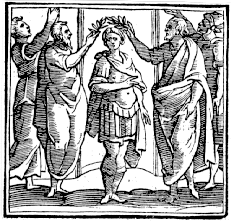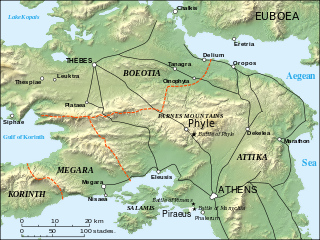"Against Eratosthenes" is a speech by Lysias, one of the ten Attic orators. In the speech, Lysias accuses Eratosthenes, a member of the Thirty Tyrants who ruled Athens following the Peloponnesian War, of the murder of his brother, Polemarchus (around 403 BCE).
Lysias's career as a speech writer, or logographer, was interrupted by the occupation of the Thirty Tyrants, an oligarchic junta placed in power by the Spartans following their victory against Athens in the Peloponnesian War, which ended in 404 BCE. Lysias, along with a small group of fellow metics, including his brother, Polemarchus, were arrested by the pro-Spartan regime on charges of general hostility and resistance to the Thirty Tyrants. According to Lysias, the group was arrested on trumped up charges just so the Thirty Tyrants could have a reason to confiscate their substantial wealth and property. The subsequent execution of Polemarchus is one of the subjects of the speech. Eratosthenes was a member of the Thirty Tyrants who oversaw the arrest of Lysias, Polemarchus, and their fellow metics. The speech was written following the collapse of the oligarchy and the restoration of democracy in Athens in 403 BCE.
Lysias is both the author and the speaker in the speech, which is considered to be among the most famous of his works. Upon the restoration of democracy in Athens, a general amnesty was granted to protect the former members of the oligarchy. This amnesty meant that the officials of the oligarchic government were protected from prosecution from acts they committed before the democratic government was restored except in cases where they personally committed a murder. The members of the Thirty Tyrants were not granted amnesty until they successfully defended themselves at their euthunai , a process in which government officials account for their actions that took place during their terms.
It is unclear whether this speech was delivered at Eratosthenes's euthunai, at a separate homicide trial, or at all. [1] Regardless of when or in what form the speech took place, Lysias's argument consists of two distinct sections: a general attack on Eratosthenes and the other members of the Thirty Tyrants pointing out their collective corruption before and after the pro-Spartan regime was installed and a cross-examination of Eratosthenes himself. Eratosthenes maintained that he was simply following the orders of his superiors and that he personally did not command much authority.
Unfortunately, no evidence exists for the outcome of the trial, or, again, for whether the speech was ever actually delivered. As a non-citizen, Lysias would not have been able to deliver the speech himself in court. Some scholars believe that Lysias wrote the speech hypothetically and circulated it in a pamphlet just to voice his opinions on the matter.
It is also suggested, however, that Lysias was granted citizenship by the democracy for a period after the 30 were expelled, in which case he could have delivered his own speech in the court. [2]

The Peloponnesian War was an ancient Greek war fought between Athens and Sparta and their respective allies for the hegemony of the Greek world. The war remained undecided for a long time, until the decisive intervention of the Persian Empire in support of Sparta. Led by Lysander, the Spartan fleet, built with Persian subsidies, finally defeated Athens and started a period of Spartan hegemony over Greece.
The Trial of Socrates was held to determine the philosopher's guilt of two charges: asebeia (impiety) against the pantheon of Athens, and corruption of the youth of the city-state; the accusers cited two impious acts by Socrates: "failing to acknowledge the gods that the city acknowledges" and "introducing new deities".

The 5th century BC started the first day of 500 BC and ended the last day of 401 BC.

This article concerns the period 409 BC – 400 BC.

Lysander was a Spartan military and political leader. He destroyed the Athenian fleet at the Battle of Aegospotami in 405 BC, forcing Athens to capitulate and bringing the Peloponnesian War to an end. He then played a key role in Sparta's domination of Greece for the next decade until his death at the Battle of Haliartus.
Year 403 BC was a year of the pre-Julian Roman calendar. At the time, it was known as the Year of the Tribunate of Mamercinus, Varus, Potitus, Iullus, Crassus and Fusus. The denomination 403 BC for this year has been used since the early medieval period, when the Anno Domini calendar era became the prevalent method in Europe for naming years.

Thrasybulus was an Athenian general and democratic leader. In 411 BC, in the wake of an oligarchic coup at Athens, the pro-democracy sailors at Samos elected him as a general, making him a primary leader of the ultimately successful democratic resistance to the coup. As general, he was responsible for recalling the controversial nobleman Alcibiades from exile, and the two worked together extensively over the next several years. In 411 and 410, Thrasybulus was in command along with Alcibiades and others at several critical Athenian naval victories.
Cephalus is a name used both for the hero-figure in Greek mythology and carried as a theophoric name by historical persons.
Anytus, son of Anthemion of the deme Euonymon, was an ancient Athenian politician. He served as a general in the Peloponnesian War, and was later a leading supporter of the democratic forces opposed to the Thirty Tyrants. He is best remembered as one of the prosecutors of the philosopher Socrates, and, probably because of that, was depicted by Plato as an interlocutor in his Meno.

Theramenes was an Athenian military leader and statesman, prominent in the final decade of the Peloponnesian War. He was active during the two periods of oligarchic government at Athens, the 400 and later The Thirty Tyrants, as well as in the trial of the generals who had commanded at Arginusae in 406 BC. A moderate oligarch, he often found himself caught between the democrats on the one hand and the extremist oligarchs on the other. Successful in replacing a narrow oligarchy with a broader one in 411 BC, he failed to achieve the same end in 404 BC, and was executed by the extremists whose policies he had opposed.
Critias was an ancient Athenian poet, philosopher and political leader. He is known today for being a student of Socrates, a writer of some regard, and for becoming the leader of the Thirty Tyrants, who ruled Athens for several months after the conclusion of the Peloponnesian War in 404/403.
The Thirty Tyrants were a pro-Spartan oligarchy installed in Athens in 404 BC, after the Athenian democracy had been defeated by Sparta in the Peloponnesian War. Upon Lysander's request, the Thirty were elected as a tyrannical government, not just as a legislative committee. Although they maintained power for only a brief eight months, their reign resulted in the killing of 5% of the Athenian population, the confiscation of citizens' property and the exile of other democratic supporters. They became known as the "Thirty Tyrants" because of their cruel and oppressive tactics. The two leading members were Critias and Theramenes.

Lysias was a logographer in Ancient Greece. He was one of the ten Attic orators included in the "Alexandrian Canon" compiled by Aristophanes of Byzantium and Aristarchus of Samothrace in the third century BC.

The Battle of Phyle was fought between Athenian exiles who were seeking to restore democracy to Athens and a Spartan garrison trying to protect the oligarchic Thirty Tyrants. In the battle, 700 Athenian exiles under Thrasybulus decisively defeated Spartans and their Athenian cavalry in a dawn ambush.
Eucleides was archon of Athens towards the end of the fifth century BC. He contributed towards the re-establishment of democracy during his years in office. He is also believed to have contributed to the new political order, with proposals that sought to deal with the challenge of the potentially disruptive minority who had supported oligarchy in the previous years.
Eratosthenes of Athens was one of the Thirty Tyrants elected to rule the city of Athens after the Peloponnesian War.

Classical Greece was a period of around 200 years in Ancient Greece, marked by much of the eastern Aegean and northern regions of Greek culture gaining increased autonomy from the Persian Empire; the peak flourishing of democratic Athens; the First and Second Peloponnesian Wars; the Spartan and then Theban hegemonies; and the expansion of Macedonia under Philip II. Much of the early defining politics, artistic thought, scientific thought, theatre, literature and philosophy of Western civilization derives from this period of Greek history, which had a powerful influence on the later Roman Empire. Part of the broader era of classical antiquity, the classical Greek era ended after Philip II's unification of most of the Greek world against the common enemy of the Persian Empire, which was conquered within 13 years during the wars of Alexander the Great, Philip's son.
The Phyle Campaign was the civil war that resulted from the Spartan imposition of a narrow oligarchy on Athens and resulted in the restoration of Athenian democracy.

Pausanias was the Agiad King of Sparta; the son of Pleistoanax. He ruled Sparta from 445 BC to 427 BC and again from 409 BC to 395 BC. He was the leader of the faction in Sparta that opposed the imperialist policy conducted by Lysander.

The Athenian Revolution was a revolt by the people of Athens that overthrew the ruling aristocratic oligarchy, establishing the almost century-long self-governance of Athens in the form of a participatory democracy – open to all free male citizens. It was a reaction to a broader trend of tyranny that had swept through Athens and the rest of Greece.